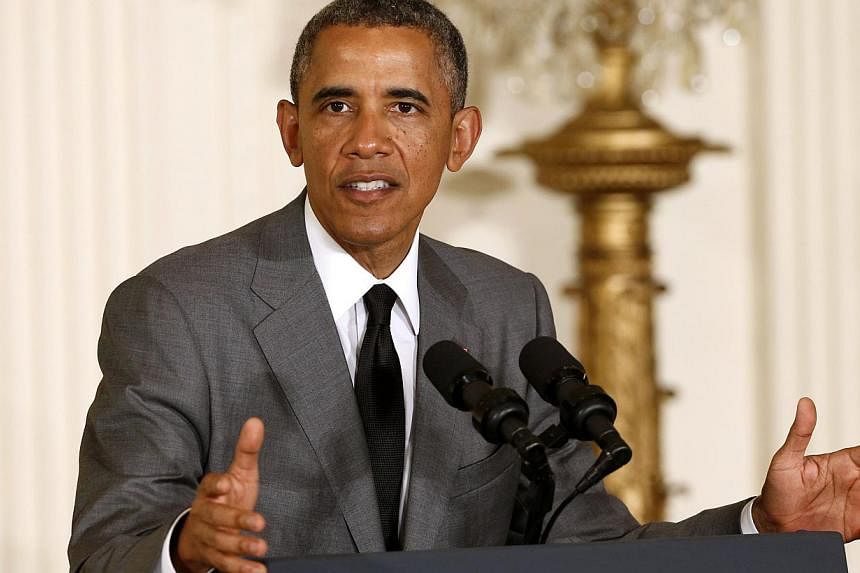WASHINGTON (AFP) - US President Barack Obama is mulling a sheaf of rather problematic options as he faces demands in Washington and Iraq to check the brazen advance of Sunni extremist militants.
TROOPS ON THE GROUND:
The message from the White House is "no chance". Obama, who brought troops home from Iraq, is not about to send them back.
Withdrawing from quagmires in the Middle East is so central to the DNA of the administration that to reverse course would repudiate the last five-and-a-half years.
"The President was very clear that we will not be sending US troops back into combat in Iraq," said National Security Council spokesman Caitlin Hayden.
Obama is on solid political ground. There is no public appetite to rewage a war in which nearly 4,500 Americans died.
AIR STRIKES:
Obama "has asked his national security team to prepare a range of other options that could help support Iraqi security forces", Hayden said.
So what could those options be?
A fallback option is US strikes, either from manned aircraft or unmanned drones. Such a tactic could still pack an explosive punch against Islamic State of Iraq and the Levant (ISIL) fighters but avoid the kind of risk to US personnel that "boots on the ground" would entail.
On Wednesday, Iraq made just such a request and Obama is also facing demands to unleash American planes over Iraq from hawks in Congress.
With little in the way of hostile ground fire or anti-aircraft fire expected over Iraq, F-18 fighter jets could fly from a US aircraft carrier, the George H.W. Bush, deployed to the Gulf.
Although no major ground force would be required, air strikes could require a small number of American forward air controllers on the ground to direct bombing runs and prevent civilian casualties. The White House has 100 troops - reportedly special operations forces - at the ready just outside Iraq, which could be sent in.
Unless ISIL militants are moving in convoys visible on a desert highway to Baghdad, analysts say air strikes would require careful targeting as the extremists operate in populated areas.
But air controllers would represent a coveted target to militants, who would relish the chance to capture and kill an American.
Advocates of US intervention say American air power could hamper and disrupt ISIL forces, who would have to avoid gathering in large groups and operate in a more stealthy manner. And bombing raids could be crucial if ISIL fighters threatened Baghdad.
But the possibility of civilian casualties is not the only downside.
Even if initial raids worked, Washington would face the risk of an open-ended campaign and would have to decide when to call off the bombing.
'YEMEN-STYLE' WAR:
Throughout his presidency, in Yemen, Pakistani tribal regions, and in Africa, Obama has favoured arms length warfare using unmanned aircraft to target Al-Qaeda and affiliated extremists.
Such aircraft can hover for hours over a target, collecting intelligence, and then strike quickly and lethally if targets suddenly emerge.
Drones could also furnish intelligence and other battlefield information to Iraq forces engaging ISIL fighters.
But Washington would also have to acquire permission from Sunni Arab states where Predator and Reaper drones could be based, including Qatar, Kuwait and the United Arab Emirates for missions over Iraq.
Those countries distrust the Shi'ite-led government in Baghdad and may refuse to give a green light.
THE POLITICAL TRACK:
Two-and-a-half years after the last US troops left Iraq, the White House is expressing increasing frustration that Iraqi Prime Minister Nuri al-Maliki ignored calls to repay US sacrifices in Iraq by cementing democracy with a multi-ethnic, pluralistic state in which minorities feel they have an investment.
Obama warns that equipment and training being contemplated for Iraqi forces would come with a condition - that Maliki promote the kind of sectarian engagement so far been lacking.
"In the absence of this type of political effort, short-term military action - including any assistance we might provide - won't succeed," Obama warned on Friday.
But if Maliki refused to embrace reconciliation with Sunnis in a time of relative calm, why would he do so know with his country splintering?
"The President is right to encourage reforms but Maliki has a system that excludes his rivals from power, that discriminates, all of this to help increase his power, so it's hard to convince him otherwise," said Daniel Byman of the Brookings Institution.
"(The) likelihood of success is low." To increase the odds, the administration has floated the idea of seeking common interests with its long term nemesis Iran, which is seen in some quarters of official Washington as a puppet master in Baghdad.
But no military alliance is in the offing.

